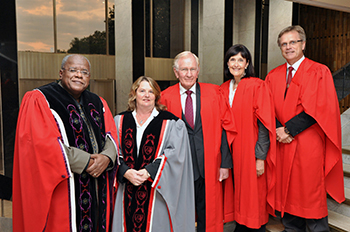Latest News Archive
Please select Category, Year, and then Month to display items
04 October 2024
|
Story Dr Cindé Greyling
|
Photo Supplied
 Scan the QR Code to unlock 30 days of exciting challenges to enhance your mental well-being.
Scan the QR Code to unlock 30 days of exciting challenges to enhance your mental well-being.
During October this year, the University of the Free State (UFS) Department of Student Counselling and Development (SCD) invites all staff and students to play an active part in their own mental health. Every day. You can do one small thing each day to improve your mental health. That is why the campaign is called DoDay – do something today and make it a do
day.
For 30 days, doable mental health activities will be shared on the UFS and SCD Instagram and Facebook pages. You will be invited to participate in the activity and to share your experience online. We encourage you to take up the challenge and share the skills for better mental health.
Be successful
As we approach the mid-year exam when staff and students are experiencing added pressure and anxiety, it is the perfect time to dedicate 10 to 15 minutes daily to your mental health. Each week we will focus on five different mental health building blocks: social wellness, emotional wellness, intellectual wellness, physical wellness, and spiritual wellness. By participating in the different activities each day, you will cover all the different wellness areas.
Be informed
During the campaign, we will also release insightful podcast interviews with experts who share their personal and professional experiences with each wellness area. It is no secret that communities are stronger together. Let us all work towards collectively improving our mental well-being and supporting one another on this journey.
Be happy
Improved mental health supports your professional and academic performance. It also helps you to make better decisions and enjoy life more. Improving your mental well-being has never been easier than following the DoDay calendar. You will receive clear guidelines on what to do each day, and you can mark off your progress and share your activities as you go.
Be a DoDay-er
Remember that maintaining mental well-being is like brushing your teeth, so we recommend it daily! Join the UFS Mental Health DoDay drive and take one small daily action for 30 days towards better mental health. Download your 30-day DoDay calendar – and remember to share and inspire others. Make every day a Mental Health DoDay
Wrongful suffering must be compensated, Prof Johann Neethling argues
2016-04-20

From the left are Prof Jonathan Jansen, Vice-Chancellor and Rector, Prof Caroline Nicholson, Dean of the Faculty of Law, Prof Neethling, Prof Rita-Marie Jansen, Vice-Dean, and Dr Brand Claassen, Head of the Department of Private Law.
Photos: Stephen Collett
|
On 11 April, the Faculty of Law held the first of the year’s series of Prestige Lectures presented by Prof Johann Neethling, Senior Professor in the Department of Private Law. The event was attended by senior faculty members, the Dean of Law Prof, Caroline Nicholson, and the Vice-Chancellor and Rector, Prof Jonathan Jansen.
In his opening remarks, Prof Jansen said “Prestige lectures are at the heart of a university’s academic endeavour. It would serve the university community well to present them more often, as they go to the heart of important issues that affect society”
Prof Neethling made a compelling case for compensation for wrongful suffering by a child born with impairments. Since the mid-1960s, the actions of wrongful conception and wrongful birth have been recognised in South African law. Wrongful conception is defined as when a healthy child is born as a result of failed sterilisation or abortion, and wrongful birth is when a doctor fails to inform parents of a disability before the birth of their child.
“The reality is that a child born with impairments may indeed suffer (sometimes extreme) pain, loss of amenities of life, which would justify an award of damages,” he said.
So far, the action for wrongful suffering has been dismissed by the High Court and the Supreme Court of Appeal. However, he highlighted several cases where wrongful conception and wrongful birth was recognised by the courts.
“Why can the same approach (for wrongful conception and wrongful birth) not be followed in wrongful suffering claims by accepting that a disabled child seeks to address the consequences of its birth?” he asked.
Prof Neethling is regarded as one of the greatest minds in Private Law, not only in South Africa but in the African continent.
A festschrift, Essays in Honour of Johann Neethling (2015), with contributions from more than 50 of his peers around the world, was also launched at the lecture.